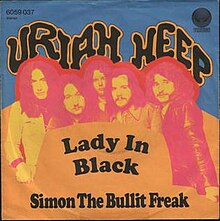Lady in Black (song)
| "Lady in Black" | ||||
|---|---|---|---|---|
 |
||||
| Single by Uriah Heep | ||||
| from the album Salisbury | ||||
| B-side | "Simon the Bullit Freak" | |||
| Released | March 1971 | |||
| Format | 7-inch single | |||
| Recorded | October–November 1970 | |||
| Genre | Folk rock, Progressive rock | |||
| Length | 4:44 | |||
| Label | Vertigo | |||
| Songwriter(s) | Ken Hensley | |||
| Producer(s) | Gerry Bron | |||
| Uriah Heep singles chronology | ||||
|
||||
"Lady in Black" is a song by the rock band Uriah Heep. It is the fourth track of their 1971 album Salisbury.
The song is credited to Ken Hensley. It tells the story of a man wandering through war-torn darkness and encountering a goddess-like entity who consoles him. It is often praised, by fans and critics alike, as Hensley's most poetic work to date. There were many b-sides for this song as a single. The most famous was "Simon the Bullit Freak" but "Bird of Prey" has also been the b-side for the song. In 1981 the band released a single in Germany and in Netherlands and the b-side was "Easy Livin'". The song was written in the key of A Minor.
A brief comment on the cover of the original vinyl release commented that for Ken Hensley inspiration was a real case: a surprise visit to his daughter's rural vicar at a moment when he was in very depressed state. The result of this meeting, and - some kind of insight - was the song "Lady in Black": a philosophical parable that tells us that evil cannot be overcome by evil itself.
"Lady in Black" has been performed in the form of rock ballads (and not having the traditional verse-chorus), and has become one of the most popular concert numbers of Uriah Heep. It achieved great success in Germany and Russia. In the United Kingdom and United States the song was never released as a single, but when it was released as a single in Germany in 1977, it became a major hit. It stayed on the top of the charts 13 weeks, and it prevented Paul McCartney and his hit "Mull of Kintyre" from reaching number one. For this achievement Uriah Heep got the "Golden Lion" award, the German equivalent Grammy and Brit Awards.
...
Wikipedia
